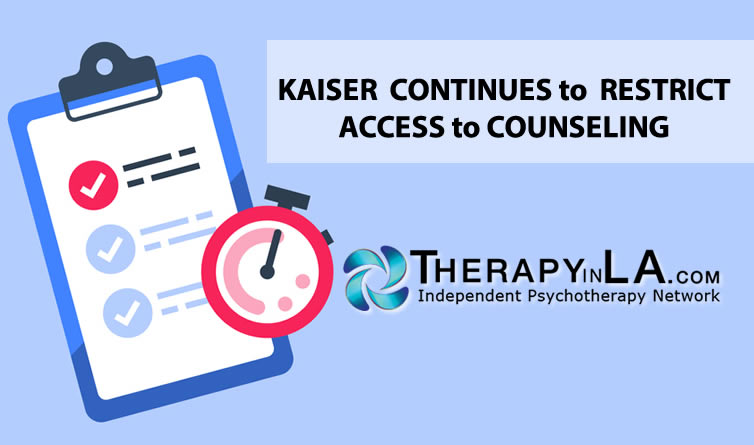KAISER CONTINUES to RESTRICT ACCESS to COUNSELING
RESTRICT ACCESS to COUNSELING
Kaiser Permanente in Northern California continues to restrict access to counseling services for its subscribers. In 2013, Kaiser was penalized $4 million for denying services by the California State Department of Managed Care, as discussed in a previous blog on this website. They were cited again in 2015 for continuing problems. Then they began to hire outside therapists on a contract basis to respond to the state’s monitoring, and justified providing only short-term therapy as the only form of therapy supported by research data, also discussed in a previous blog.
Now, Kaiser argues that it has greatly improved its psychological care: hiring more than 1,200 outside therapists, improving patient access to appointments, and expanding its training program for therapists. And, regulators at the Department of Managed Health Care report that Kaiser is meeting the guidelines established in an agreement from 2017, which took two years to negotiate (Ken Pope: Kaiser’s Mental Health Professionals Hit Picket Lines).
But digging a little deeper with therapists, patients, and experts in mental health care questions these conclusions. While the changes may look good on paper, more accessible and genuine helpful care is still not available.
For example:
- Initial interviews are done from call centers on the phone, for thirty minutes. These interviews are done in a timely way, but then patients must wait for a therapy appointment usually 4-8 weeks. Once they have this face-to-face appointment, they have to tell their story one more time, which can be traumatizing and painful – unnecessarily so. Thirty minutes is hardly an adequate amount of time to begin therapy, especially if there’s a wait before actual counseling begins. A more standard initial interview is about an hour, sometimes more.
- Even children who may be experiencing severe depression are often seen only once in 4-6 (sometimes 8) weeks, as reported by some therapists. These therapists are so overloaded with patients that more frequent sessions are impossible. This time lag only serves to worsen symptoms in most instances.
- The National Union of Healthcare Workers, which represents 3,600 therapists in California, has continued to confront Kaiser for this absence of care. A survey of these therapists (759 of them) showed that 71% report that wait times for appointments have worsened in the past two years. Only 4% of these therapists said that individual weekly appointments are available for patients who need them (and weekly appointments are considered basic care). Kaiser therapists have gone on strike over these issues.
The only conclusion is that Kaiser has succeeded in producing data to satisfy regulatory demands perhaps, but that the genuine quality of care is still sorely lacking. Many therapists report that patients who have the means go outside the system and pay for therapy out of pocket, which allows people with financial resources to get help, but denies subscribers to the Kaiser plan the help they deserve. Many of us in the Independent Psychotherapy Network provide therapy to Kaiser subscribers, often at more affordable fees, as part of our effort to meet our professional and ethical commitment to quality care.
Alan M. Solomon, Ph.D. is a clinical psychologist in private practice in Torrance. A member of the Independent Psychotherapy Network, he can be reached at 310 539-2772 or dralanms@gmail.com
Copyright 2020 by Alan M. Solomon

